Meet the Next Generation of LED Light Bulbs
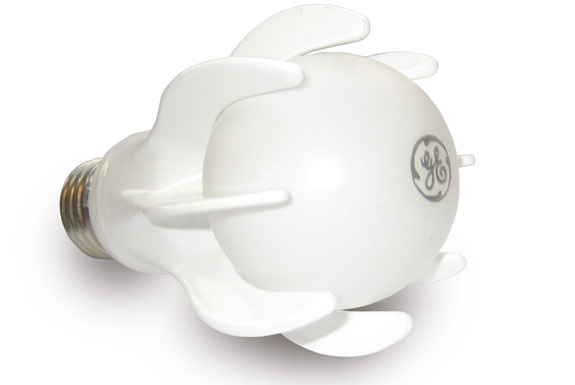
SPOT MORE COOL STUFF:
Concept (Not For Sale . . . Yet) | Eco-Friendly | 1 Comment
| All Tech & Gadget Reviews
Consumers are currently accustomed to seeing LEDs as the prime components of modern flashlights and Christmas tree lighting. But heretofore only specialty lamps have produced light from light-emitting diodes.
That will be changing over the next few months. LED light bulbs are coming to a lamp near you. An array of companies are launching LED bulbs that will fit into regular light sockets. And, unlike previously marketed LED retrofit bulbs, these will produce a light in the same color temperature range as incandescent blubs, 2,700K to 3,000K.
Initially most new LED bulbs will be the equivalent brightness of a 40-watt incandescent. By early-2011 stores should also have the LED replacement for the 60-watt incandescent, the world’s most popular lightbulb.
LED bulbs last much longer than conventional ones; the LED bulbs in this review should be good for at least 25,000 hours, a huge jump from the 1,000 to 2,000 hours offered by typical incandescents. LEDs are also much more energy efficient—an LED needs only 11 or 12 watts to produce the same amount of light as an incandescent 60-watt bulb.
The catch, as is often the case with new technology, is the cost. The new generation of LED bulbs will hit the shelves with a price tag between US$40 and $60, though Spot Cool Stuff expects that price to drop by more than half in the next two years.
With that, here’s our look at five LED bulbs slated to appear on store shelves sometime in the next 8 months—and one you can already purchase online:
GE Energy Smart LED
GE wins our Most Interesting New LED Bulb Design Award. What looks like white plastic fingers grasping onto the bulb serves a useful function—they help disperse light evenly in all directions. First on the market from GE will be a 40-watt incandescent equivalent; it runs on a mere 9 watts of electricity. An GE replacement for a 60-watt bulb should follow about a year later.
Anticipated in stores in North America: Late 2010 or early 2011
LEARN MORE | PURCHASE LED LIGHTING | FOLLOW US ON TWITTER |
Philips EnduraLED
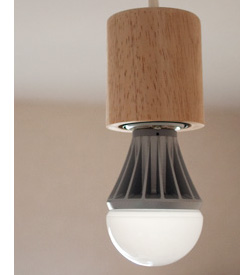 Philips, one of the most innovative LED lighting companies, has a whole line of LED bulbs in various phases of development. These include a 4-watt candle shaped bulb and an 11-watt dimmable flood lamp. The most popular and useful EnduraLED is expected to be their 12-watt replacement for a 60-watt incandescent; it will be a pricey $60 when it hits the market.
Philips, one of the most innovative LED lighting companies, has a whole line of LED bulbs in various phases of development. These include a 4-watt candle shaped bulb and an 11-watt dimmable flood lamp. The most popular and useful EnduraLED is expected to be their 12-watt replacement for a 60-watt incandescent; it will be a pricey $60 when it hits the market.
Anticipated in stores in North America: Around November 2010.
LEARN MORE | PURCHASE LED LIGHTING | FOLLOW US ON TWITTER |
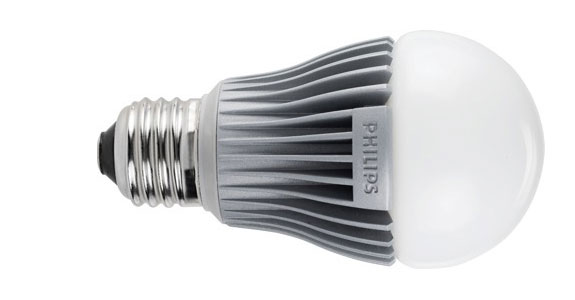
Toshiba E-CORE
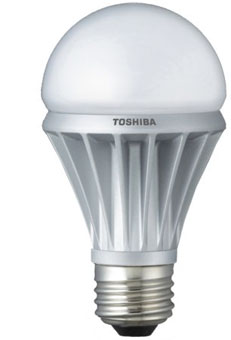 Toshiba is already selling this E-CORE LED bulb in Japan where it produces as much light with 4.3 watts as traditional bulbs do with 40 watts. Even more impressive: Toshiba claims that their LED bulb will last 40,000 hours, which is 37% longer than the other LED bulbs in this review. But will it really last that long? We’ll know for sure in 27 years.
Toshiba is already selling this E-CORE LED bulb in Japan where it produces as much light with 4.3 watts as traditional bulbs do with 40 watts. Even more impressive: Toshiba claims that their LED bulb will last 40,000 hours, which is 37% longer than the other LED bulbs in this review. But will it really last that long? We’ll know for sure in 27 years.
Anticipated in stores in North America: Should be widely available by the end of 2010
LEARN MORE | PURCHASE LED LIGHTING | FOLLOW US ON TWITTER |
Osram Sylvania LED
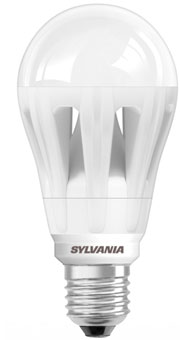 The color temperature of Sylvania’s anticipated LED bulb measures in at a perfect 2,700K and so will have none of the blue hue typical of LED lighting. Their bulb, which exceeds the light output of a 60-watt incandescent using only 12 watts of juice, will be dimmable. Sylvania is also working on a LED equivalent to a 75-watt incandescent.
The color temperature of Sylvania’s anticipated LED bulb measures in at a perfect 2,700K and so will have none of the blue hue typical of LED lighting. Their bulb, which exceeds the light output of a 60-watt incandescent using only 12 watts of juice, will be dimmable. Sylvania is also working on a LED equivalent to a 75-watt incandescent.
Anticipated in stores in North America: Around November 2010
LEARN MORE | PURCHASE LED LIGHTING | FOLLOW US ON TWITTER |
Lemnis Lighting Pharox
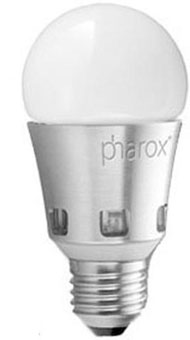 Lemnis has announced two types of new Pharox LED bulbs. The Pharox 200 supposedly creates the same light of a 40-watt incandescent using only 5 watts—if that’s in fact true (Spot Cool Stuff hasn’t conducted or seen any independent testing) that would make the Pharox 200 by far the most energy efficient LED bulb.
Lemnis has announced two types of new Pharox LED bulbs. The Pharox 200 supposedly creates the same light of a 40-watt incandescent using only 5 watts—if that’s in fact true (Spot Cool Stuff hasn’t conducted or seen any independent testing) that would make the Pharox 200 by far the most energy efficient LED bulb.
More amazing still is the Pharox 300; it is dimmable and promises to match the light output of an old-fashion 60-watt bulb using only 6 watts.
Both bulbs have been speced at around 3,000K, which is within the range (albeit at the blue end of the spectrum) as regular bulbs.
Anticipated in stores in North America: Already for sale on Amazon!
LEARN MORE | PURCHASE LED LIGHTING | FOLLOW US ON TWITTER |
Related posts:
3 Luscious Lamps From Lumens
How To Charge an iPod with an Onion and a Sports Drink ← really!
Samsung Reclaim: The Free Smartphone Made From Corn
Inhabit’s Lamp with 1,607,045 Options












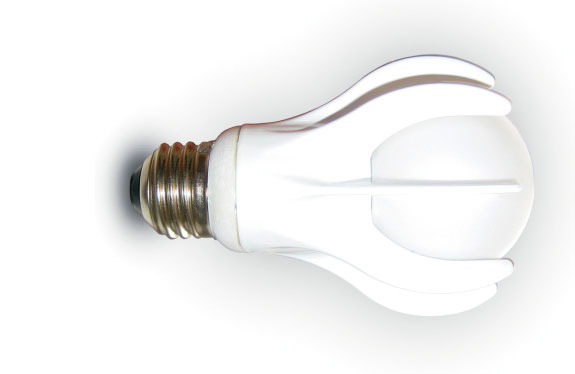
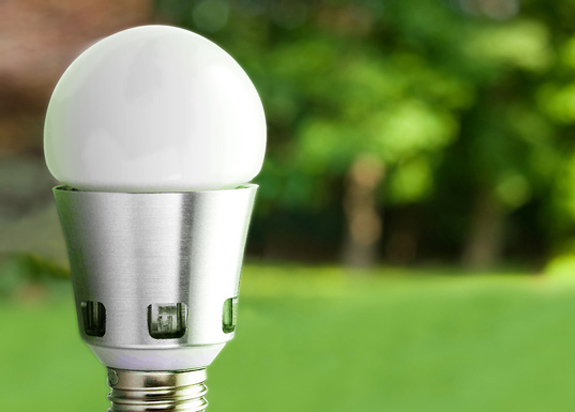











May 28th, 2010at 11:45 am(#)
I have a few Pharox in my home. They work well. There are a few different sizes of Pharox bulbs with differences in light output if you want some variance. I am in N. America and kuuala.com is where I got mine.
[Reply to this comment]